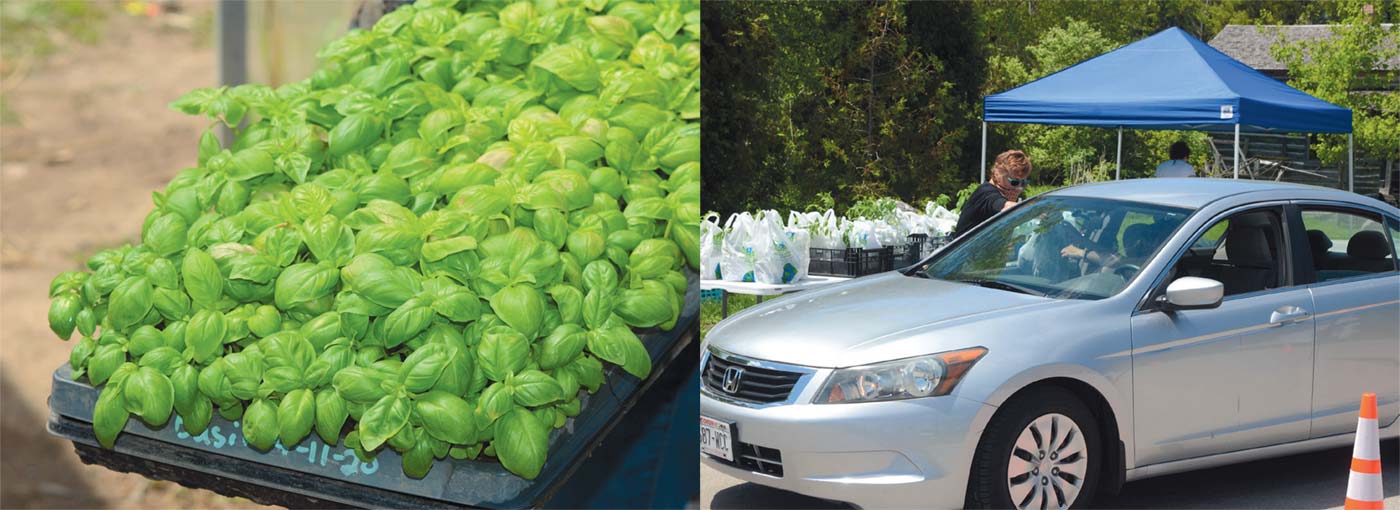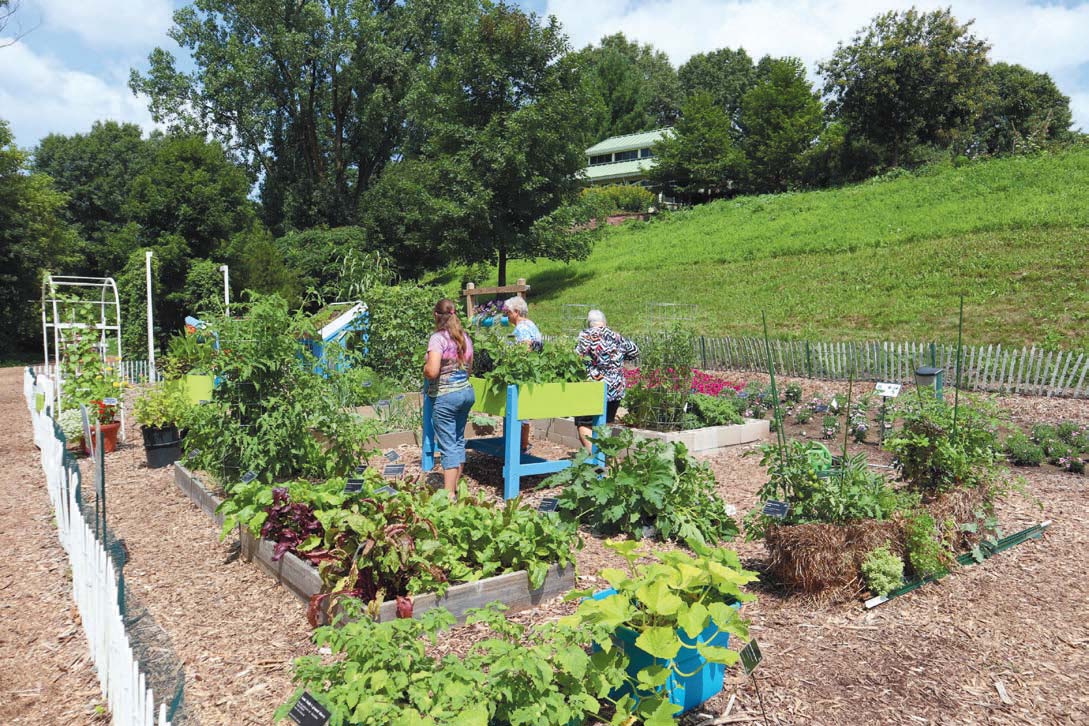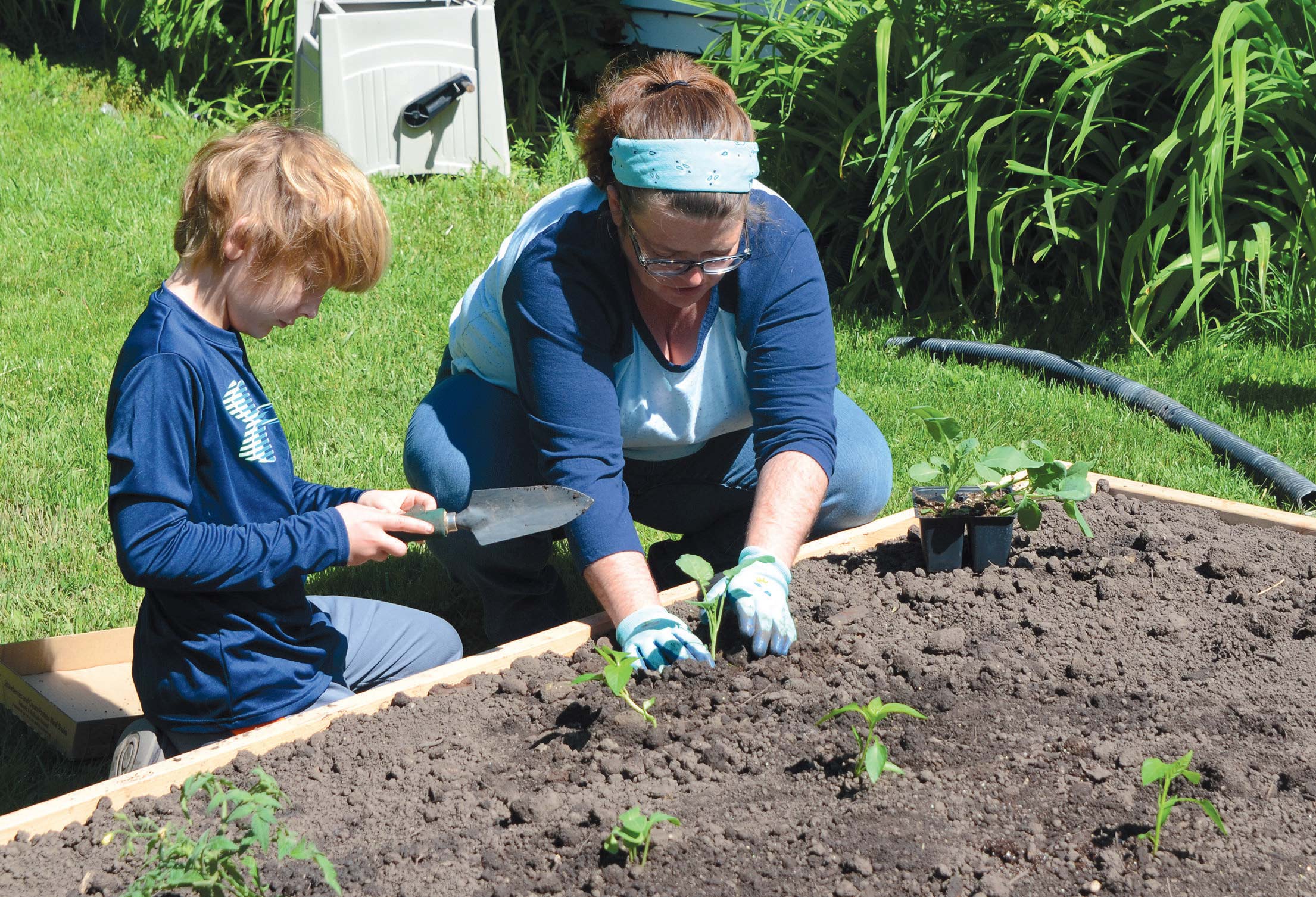New Victory Garden Initiative is a Win-Win for Everyone
For many of us, the thought of going out in the garden, picking a bright red tomato off the vine, wiping the dust off, then letting the juice run down our chins as we bit into its summer goodness, helped keep us sane during the long COVID-19 quarantine of spring. No wonder that once the “Safer at Home” shackles were unlocked, we headed straight for the garden store.
Dubbed Victory Gardens 2.0 by the National Garden Bureau, the program recalls the Victory Gardens of World Wars I and II when gardens were planted due to wartime food rationing. The 2020 version has been, in part, a reaction to the pandemic that suddenly cast doubt on the safety of almost every object we touched. This food would be grown at home by family members and bring nutritious produce into the kitchen and dining rooms across America.
The Door County Seed Library is a grassroots community effort that launched in the Sturgeon Bay Library in March 2019. Members can check out free seeds, plant them and grow a summer bounty making use of library resources, then save the seeds for next year.
“When we started in 2019, we were following the model of a typical seed library and we loaned out over 2,600 packets of seeds, and this year we were going to expand to six more libraries including the one on Washington Island,” seed library co-founder Penne Wilson said. “We had put together the packets of seeds, the membership forms and had distributed everything out to the community, then BAM! I asked everyone to send everything back to me so I could re-inventory everything and come up with plan B. I really felt like with what’s going on, there’s never been a more important time for people to have access to seeds. We ended up creating seed bundles with 15 packets in each and started offering those to the community. While we were working on that, we came up with the idea of the Door County Victory Garden Initiative.”
The first element in the initiative was offering pre-assembled bundles of non-hybrid seeds. Some were donated by commercial seed companies, some were purchased, and still others were donated by local growers. Hybrids were culled because they are not ideal for saving seeds, she explained.
“Ultimately that’s what we are partly about, encouraging people to learn how to save seeds and then donate them to us and to their neighbors and friends,” said Wilson. “The response was overwhelming. In just six weeks the seed library distributed nearly 300 seed bundles to the Door County community.
The second element was offering free vegetable plants. A number of individual volunteers as well as Emerald Acres and Flying Tractor farms in Door County helped get things started by growing tomatoes, peppers, kale, cabbage and herbs indoors. Then the plants were distributed in early June.
“We asked the community to take these seedlings and grow this food, and all we asked is that they would share some of their extra veggies with their neighbors,” Wilson said. “Planning anything during the stay-at-home order is difficult because nothing is certain. I keep using the word pivot, because man-o-man are we pivoting. We had to modify our plans based on the conditions, because the No. 1 concern is to make sure people stay safe.” Door County gardeners were enthusiastic with almost 250 new members joining the seed library this spring, according to Wilson.
“Most of the new members have some experience gardening, but a few don’t,” she said. “Door County Master Gardener Karen Kidd is using Facebook to publish her real-time experience as she starts her seeds indoors or plants outside,” Wilson said. “It’s really awesome the number of people who are responding, I think we are getting a lot of people who are learning what they need to do by looking at her posts.”
Wilson said she is the “least likely” person to have ever started a seed library. She and her husband moved to Door County several years ago and while looking for volunteer opportunities read about the Appleton Seed Library in an issue of Edible Door.
“I thought what a fantastic thing to do, give free seeds to people, and everything fell into place from there,” she recalled. Despite her involvement, she only started saving seeds a year ago and this year she is starting seeds indoors. “I planted tomatoes, peppers, cabbage, and kale. Partially because of this pandemic, I feel a need to help and I want to grow more food this year, too.”
‘We asked the community to take these seedlings and grow this food and all we asked is that they would share some of their extra veggies with their neighbors.”
— Penne Wilson, Door County Seed Library

LEFT: These basil seedlings were started at Emerald Acres Farm near Sturgeon Bay to be handed out by the Door County Seed Library. RIGHT: Karen Kidd gives a bag of seedlings to one of the many people who lined up at Crossroads at Big Creek on Saturday, June 6 to receive plants from the Door County Seed Library. The library distributed 1,404 plants and 360 potatoes during the day. - Photos by Rick Cohler
FAMILY PROVIDES HEAD START
On a mid-May day, David and Valerie Boyarski, along with their children, Violet, 9, and Henry, 5, were at their Emerald Acres farm near Sturgeon Bay busy planting eggplant, lettuce and basil seedlings for the June giveaway. The greenhouse on the property has let them get a head start for area gardeners. The couple purchased organic seeds and are growing them as a donation to the seed library. They are also growing tomatoes and peppers.
Wilson, who has been a customer of the Boyarskis for several years, approached them and asked if they would be interested in being part of the project. “It just seemed like a natural fit,” Valerie said. “I think there’s a real opportunity here on several fronts,” she added. “One is to spread some positivity and to help our community come together and help each other and it’s a perfect fit with what we’re doing; trying to increase our community’s capacity to grow fresh healthy food for their families. We have all these seeds and whatever we can do to get them into the hands of people and help them grow healthy food, we feel that’s our mission.”
NEW LEAF’S ‘GARDEN BLITZ’
Door County is not unique in the draw for more people to start gardening. Green Bay-based New Leaf Foods is an organization whose goal is to “support the health and wellbeing of people by promoting healthy food access and education and by cooperating throughout Northeast Wisconsin to build a thriving local food system in a clean environment,” according to the New Leaf website. A spring program New Leaf conducts is the “Garden Blitz,” which offers installed raised-bed gardens.
The Blitz is a comprehensive approach to urban agriculture by selling and installing raised-bed gardens at a low cost and by providing education and mentorship for gardeners. The garden boxes are installed over the course of one weekend by teams of volunteers. In addition to their garden boxes, new gardeners have a variety of educational opportunities, including a mentor program, which matches experienced gardeners with new growers. Each year over 100 volunteers come together over a weekend to install over 100 garden boxes in the backyards, front yards, schools, libraries, community centers, social agencies, food pantries, shelters, and senior living centers in the Green Bay area. Since 2014, Blitz volunteers have built 631 gardens in the community. One of the new gardeners is Kelly Brinker of De Pere. Kelly and her 10-year-old son, Jack, are tackling the project this summer growing mostly what he likes.
“He has specifically asked for basil and chives because you can just pick them and eat them,” Kelly said. She also plans to grow lettuce, broccoli, peas and tomatoes. “I’ve always wanted to have a raised garden, but being a full-time working single mom I haven’t had time,” Kelly said. “We now have all this time so I wanted to teach my son about it.” Kelly plans to get some tips from a mentor the Garden Blast program assigns. She is looking forward to just being outside in the sun with her son in the garden and creating some memories.
“I remember my mom had a strawberry patch and raspberries and I would always help,” she recalled. “I would go out there and help for a bit, and of course eat a couple things. Those are memories I want my son to have.”

The Partnership Gardens at the Green Bay Botanical Garden. Contributed photo.
OTHER RESOURCES
Horticulturists at the Green Bay Botanical Garden and the University of Wisconsin-Extension say they have received significantly more requests for information and tips this spring.
Andrea Ackerman, the UW-Extension horticulture agent said, “With the safer-at-home, we’re trying to inform our consumers either experienced or new gardeners about easy ways to have a Victory Garden in order to have better access to food security,” she said.
At the Green Bay Botanical Garden, chief horticulturist Mark Konlock said they have noticed a definite uptick in people visiting the Garden’s social media, especially the “stay planted” section on the Garden’s website, which shares information about gardening and information collected from other websites.
So if nothing else good comes out of this COVID-19 pandemic, perhaps many of those trying Victory Garden 2.0 will continue to grow more of their own food after this ordeal passes and will hand down these memories to their children as the years pass.
Resources: National Garden Bureau at NGB.org which offers a 10-point plan to grow a Victory Garden 2.0; doorcountylibrary.org/seed library; gbbg.org; browncountywi.gov/departments/extension; learningstore.extension.wisc.edu





